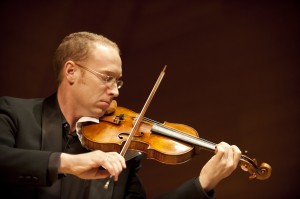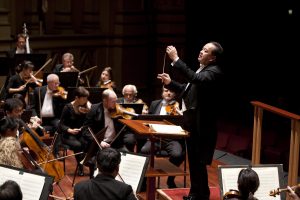Tchaikovsky’s Third or Thayer’s Second?
The San Diego Symphony titled last Friday evening’s Jacobs Masterworks program “Tchaikovsky’s Third Symphony”, but when the audience rose to its feet in wonderfully noisy acclamation just before intermission, it was pretty clear that they had spontaneously re-named the evening “Jeff Thayer’s Second”, to honor the San Diego Symphony’s concertmaster for his impressive performance of one of the monuments of the violin repertoire, Béla Bartók’s Violin Concerto No. 2. Thayer’s colleagues in the Symphony – and SDS Music Director, conductor Jahja Ling – joined the applause, as cries of “Bravo”, whistles of approval and even some foot-stomping rolled in from the auditorium. One of the first on his feet at the concerto’s last note was none other than Irwin Jacobs himself, after whom both the series and the San Diego Symphony’s home are named.
And it was an ovation richly deserved. Thayer’s playing was everything the composer could have wished: immaculate technical mastery allied with expressive insight, and it was tight as a drum, leaving no place for self-display or “virtuoso” indulgence.
Like all of Bartók’s major works (other concerti for violin and piano, his signature Concerto for Orchestra, the six string quartets), this violin concerto is shot through with both autumnal glow and raucous vulgarity, all of it woven into a buzzing, many-gaited musical fabric that requires both soloist and orchestra to turn on a dime without losing focus or rhythmic coherence. The biggest challenge of all is that the soloist must lead the way, urging the music forward and goading it into action when Bartók’s occasional “night music” threatens to slow it down. This Thayer did with astonishing command, keeping the work’s internal engine running even in the most intimate moments when his dialogues with the harp and celeste demanded delicacy as well as strength.
Claude Debussy’s Prelude to the Afternoon of a Faun opened the concert in a reading – led with utter security by SDS Music Director Jahja Ling – that was cool, but far from bloodless. When French music – especially Debussy – is played well, it can be nearly impossible to describe, but even the cliches are worth repeating here: transparent, with a kind of visible depth beneath a gleaming surface. SDS Principal Associate Concertmaster Nick Grant – taking over for his colleague Thayer before the Bartok challenge – placed occasional solo lines in high relief, and Principal Flute Rose Lombardo’s restrained statements of the meandering theme-motive pulled the piece together from beginning to end.
Far from being a warhorse, Tchaikovsky’s Symphony No. 3 is something of a neglected step-child among its renowned siblings. And it would be a disservice to Tchaikovsky to pretend that there is a lot of music in this piece. There are a lot of notes, and it is greatly to the credit of both the orchestra and its conductor that they made every one of them count. The composer himself wrote to his patroness, Nadezhda von Meck, a railway magnate’s widow whose financial support made Tchaikovsky’s composing career possible, that he had completed a symphony in which there was nothing new and little that pleased him.
But geniuses have their own standards, and we should be grateful for this work, which often seems to be one huge song, continually prodding itself into one of the multitude of dance rhythms that embroider the entire score. Nicknamed the “Polish” symphony (not by Tchaikovsky) after its premierè, it ought to be called the “Dance” symphony to highlight the dance rhythms that characterize almost every movement, particularly the extended rondo that closes the piece, where Tchaikovsky sends a coded message to the Tsar with the energetic polonaise that was 1877 code for “Romanov glory.” If it seemed to take a long time to get there, the last pages achieved lift-off into a hymn-like celebration of music’s power to show us the edge of something unknowable, and to teach us a short lesson in what it means to be human.
In a 50-year professional career, Marcus Overton has crossed disciplinary lines to work in theatre, opera, dance and broadcasting. Trained as an actor by Alvina Krause at Northwestern University, he made his professional debut in the title role of Shakespeare’s RICHARD III. Work as a director in both theatre and opera (Lyric Opera of Chicago, Chicago Opera Theatre, San Diego Opera) followed, as well as administrative positions at the Ravinia Festival, the Smithsonian Institution’s performing arts program, and the general manager’s post at Charleston’s Spoleto Festival USA. On South Carolina’s famed ETV radio network, he has been producer and host of Spoleto Today for 20 years, as well as an Emmy Award-winning producer of six television specials about the Festival. He is currently a Consultant for Special Projects at the La Jolla Music Society.




